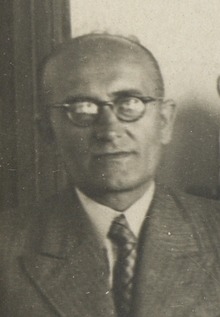Loading AI tools
Czech mathematician (1893–1960) From Wikipedia, the free encyclopedia
Eduard Čech (Czech: [ˈɛduart ˈtʃɛx]; 29 June 1893 – 15 March 1960) was a Czech mathematician. His research interests included projective differential geometry and topology. He is especially known for the technique known as Stone–Čech compactification (in topology) and the notion of Čech cohomology. He was the first to publish a proof of Tychonoff's theorem in 1937.
Eduard Čech | |
|---|---|
 Eduard Čech at the First International Topology conference in Moscow, 1935 | |
| Born | 29 June 1893 |
| Died | 15 March 1960 (aged 66) |
| Alma mater | Charles University (PhD) |
| Known for | Stone–Čech compactification Čech cohomology Čech closure operator Čech nerve |
| Scientific career | |
| Fields | Mathematics |
| Institutions | Masaryk University Charles University |
| Thesis | On Curves and Plane Elements of the Third Order (1920) |
| Doctoral advisor | Karel Petr |
| Doctoral students | Ivo Babuška Vlastimil Dlab Zdeněk Frolík Věra Trnková Petr Vopěnka |
He was born in Stračov, then in Bohemia, Austria-Hungary, now in the Czech Republic. His father was Čeněk Čech, a policeman, and his mother was Anna Kleplová.[1]
After attending the gymnasium in Hradec Králové, Čech was admitted to the Philosophy Faculty of Charles University of Prague in 1912. In 1915 he was drafted into the Austro-Hungarian Army and participated in World War I, after which he completed his undergraduate degree in 1918.[1] He received his doctoral degree in 1920 at Charles University; his thesis, titled On Curves and Plane Elements of the Third Order, was written under the direction of Karel Petr.[2] In 1921–1922 he collaborated with Guido Fubini in Turin, Italy. He taught at Masaryk University in Brno and at Charles University. Ivo Babuška, Vlastimil Dlab, Zdeněk Frolík, Věra Trnková, and Petr Vopěnka have been doctoral students of Čech.[2]
He attended the First International Topological Conference held in Moscow 4–10 September 1935. He made two presentations there: "Accessibility and homology" and "Betti groups with different coefficient groups".[3]
Seamless Wikipedia browsing. On steroids.
Every time you click a link to Wikipedia, Wiktionary or Wikiquote in your browser's search results, it will show the modern Wikiwand interface.
Wikiwand extension is a five stars, simple, with minimum permission required to keep your browsing private, safe and transparent.